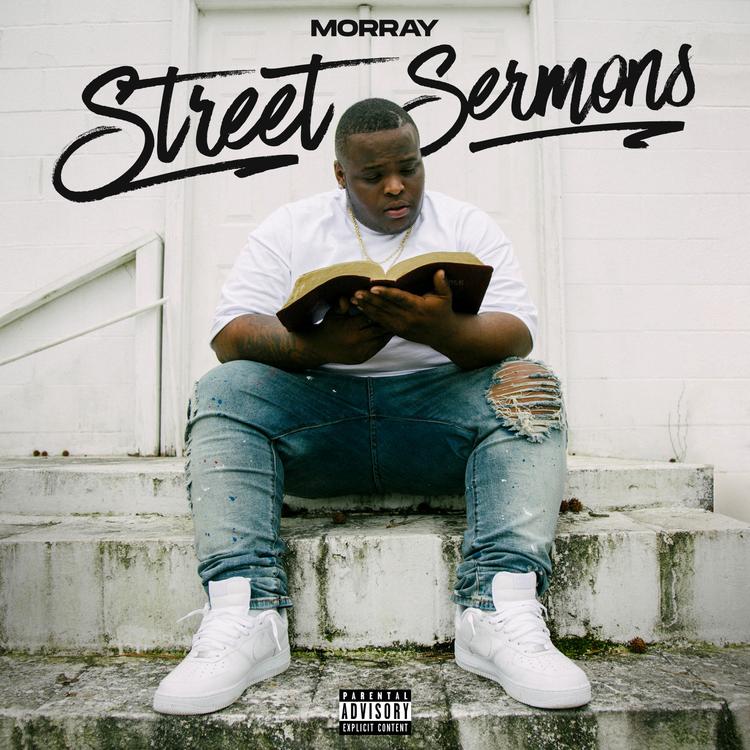Morray makes a splash
Fayetteville rapper brings the heat with his debut project
The cover art for Morray’s debut album “Street Sermons.” The project is filled with not only wonderful lyricism, but an extensive vocal range of hooks as well. Morray uses his first tape to prove why icon J. Cole is pushing his music hard.
May 19, 2021
North Carolina rapper Morray has quickly blown up in the last half year, gaining co-signs from superstar J. Cole as well as other popular N.C. rappers. Following his breakout “Quicksand,” he would tease his upcoming debut album “Street Sermons,” finally releasing it in May.
The album opens up with the intro track, “Mistakes.” It instantly showcases Morray’s incredible vocal range, and melodic choruses are the key part of his music so far. His music is extremely reflective, and isn’t nearly as materialistic as a lot of the music today. His rapping skills are also off the charts, and he starts showing his ability to switch flows early on. “Trenches” is the follow up, which details how Morray has overcome the struggle of living in the projects. He reflects on people that haven’t been able to get out of his neighborhood, and how many souls get lost into the path of drugs, gangs and criminal activities. It showcases the lyrical talent that he clearly possesses, and the truth behind his words.
“Quicksand” is the lead single for the album, tallying over 70 million views on YouTube since releasing in November, and it has one of the catchiest hooks of the last year. Despite the upbeat melody he holds in the song, the lyrics actually go quite deeper, with Morray referring to falling into the quicksand of desperately figuring out ways to get money. The music video for the track is one of the most genuine I’ve seen in awhile, where he stays true to himself and his neighborhood, more so just dancing to the track with his friends and family. The most hopeful song follows, with “That’s on God.” Morray just projects what he wants to achieve like giving his family financial security and reaching his peak in music, all while finishing the phrases with “that’s on god.”
“Nothing Now” is the fifth track, and it features one of the faster flows on the album. It’s another insight on how much potential Morray has with his music and his true rapping ability. “Reflections” practically embodies the entire theme of the album. He calls out his past demons, making a point that he’s moved on from his past and all he wants is to better himself. He throws out almost an angry tone on the album, full of rage against the things he has done, but still coming to terms with it.
The next track is “Big Decisions,” where Morray pens the issues that have been facing him, and how he gets the feeling that he will have to choose between his music career and friends. He reveals how he’s lost many friends since his newfound fame, and how his bodyguard and family is all that he needs. Through the first half of the album, Morray does a very good job of sticking to the theme of his debut project. “Can’t Use Me” is the mental territory marker for him. Declaring that he’s done with people using him, and how he’s not going to be paying anybody’s rent or tuition unless they are someone extremely close. He drops some clever bars on the song, including “I don’t need a shrink, just press record and let me loose.”
The smaller single before the album was “Kingdom.” Despite a solid hook, it’s a fairly mediocre track just considering that it sounds like a second attempt at Quicksand. It’s not bad by any means, and is probably the only low point throughout the tape. “Switched Up” is a sadly realistic tale, where Morray assumes the role of a young man who gets backstabbed by a friend. Crying out “You was my dog, you was my friend, you was my cousin.” But shortly switching to claiming that his friend was neither of those things all along. It’s a relatable track to a lot of people, and continues to prove his lyricism as fairly valid.
The final three tracks start off with “Facade.” It’s probably the weakest track on the album, solely because of the production. It took a pretty great piano sample but threw it on a faster paced beat that just doesn’t fit Morray. It fades into “Real Ones,” which is almost a sequel to Switched Up, where he exclaims his fears that he feels like his friend is going to switch on him. It’s kind of a repetitive song, but his vocals make it so addicting like the rest of the mixtape. That leaves the outro, “Bigger Things.” It’s the total closer to the debut project, where Morray speaks on how good it feels to know his hard work has finally paid off. He reflects on how despite his rough come up, he was able to master his craft and is now being hunted down to sign with every major label.
After hearing Quicksand in November, I knew Morray had absolute star potential. He took the perfect route for a debut album with no features on it. It’s just 37 minutes of him showcasing his raw, untapped talent. It was a great listen, and I believe it’s around a 7.5 or an 8 out of 10. The only issue was the repetitive production, reusing piano or guitar samples a little too often. However, Morray’s incredible vocals and great songwriting helped keep this project enjoyable the entire way through.







